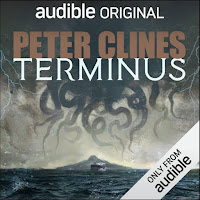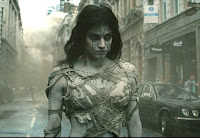Hey, look! It’s even more bonus content! What the hell? This is turning into one of those blogs where there are semi-regular posts.
Hahahaa no it’s not. I’m just going to be really busy in November (for a couple of reasons) so I wanted to give you some extra stuff now while I had time. Plus, hey, it’s Halloween and I can always blather on about this sort of stuff a bit more. So everybody wins.

Some of you may be familiar with
Fido, a wonderfully heartwarming (no, seriously) zombie story about a boy and his… well, pet zombie.
It was also a nearly fifteen year labor of love for Andrew Currie, Robert Chomiak , and Dennis Heaton, taking them from film school to Lionsgate Pictures, where the movie finally came to be with a very impressive cast. I got to speak with Andrew back then, and we talked a lot about his creative process and how the story evolved going from an elaborate novella to a screenplay to a finished movie.
A few of my standard points before we dive in. I’m in bold, asking the questions. Please keep in mind a lot of these aren’t the exact, word-for-word questions I asked (which tended to be a bit more organic and conversational), so if the answer seems a bit off, don’t stress out over it. Any links are entirely mine and aren’t meant to imply Andrew’s specifically endorsing any of the ideas I’ve brought up here on the ranty blog—it’s just me linking from something he said to something similar that I’ve said.
By the nature of this discussion, there are going to be
a few small spoilers in here, though not many.
Check out the movie if you haven’t seen it yet. It really is wonderful. I mean, it’s a feel-good zombie movie about families. What more could you want?
Material from this interview was originally used for an article that appeared in the CS Weekly online newsletter.
What got you into filmmaking and screenwriting?
I guess just, from a really young age, being a fan of movies.
I remember I was six years old and my dad took me to
2001: A Space Odyssey in the theatre.
And I still remember just being completely blown away by the movie—obviously not understanding it, but the visceral impact of the images.
And really being a life long film buff, a film geek I guess you’d say,
staying up late watching horror filmsonce everyone else went to bed.
The standard path (laughs).
You’ve written a lot of the stuff you’ve directed. Do you think of yourself as a writer or director more?
I think of myself as a writer-director. I generally write on most of the things I direct. I certainly have directed stuff I didn’t write. I just find that, to me, there’s that idea that there are three films; there’s the film that you write, there’s the film that you shoot, and there’s the film you complete in post-production. Those three phases to me are so fluid that they tend to all become one. The writing process for me is directing on the page quite a bit. I guess I find that being involved in the writing is fairly critical.
D’you think you’d ever write a screenplay without wanting to direct it?
Oh, I’d love to. (laughs) But God knows who would want to direct it.
Yeah, I’m not the fastest writer, and that’s another wonderful thing about collaborating. What’s exciting for me about film is that it’s collaborative, it’s bouncing ideas off other creative people. When we wrote Fido–Robert, Dennis, and I–we spent a lot of time in the story room together just bouncing around ideas. I think often that’s the most fulfilling way of working, because you become so much more inspired by working with collaborators.
You’ve worked with Robert a few times, yes?
Yeah, Robert and I have co-written a couple things. He’s wonderful, and he’s got that combination of having a wonderfully bizarre take on the world but also being a very pragmatic writer as well. He’s great.
Now, Fido was originally a short story by Dennis, yes?
Well, Dennis had written this… it was somewhere between a short story and a script.
It was seventy or eighty pages, it was pretty long.
It was about a little boy in a small town who had a pet zombie.
The boy just fed him raw meat so he wouldn’t eat people.
We all went to
Simon Fraser Universitytogether for film school.
Dennis and Robert did two years of the program, and I went for the whole four years, and when I graduated we all decided we wanted to write something together.
It was one of those things where everyone brings five ideas to the table, and Dennis brought
Fido.
We just all immediately got excited by it and the potential for it.
We actually
wrote the first draft really quickly.
A lot of the basics came really quick, but it really was nothing more than a world with zombies and
Leave It To Beaver, cardboard cut-out characters.
There was a lot of fun, but we also didn’t have much to say about the world.

That was back in 1994. We went off and did other projects, and I took the script out to the
Canadian Film Centerin 1996 and worked on it out there, and then came back. We started working on it again in 2001, and by then we had all developed more as writers. We approached it much more from theme
and character, and it made such a difference. The world became much more complex. And then September 11th happened and that started to affect the story in a political way as well. It just started getting layers that were really exciting for me as the director. You’re telling this absurdist comedy and you’ve got these other layers that you’re putting in, and whether people get them or not became an interesting debate for us. You can lay something in, but if it’s too subtle it just flashes past people.
You mentioned 9/11. There’s a lot of underlying paranoia and a very us-vs-them mood, even past the usual zombie movie standards. How much of that was very deliberate?
Oh, it was very specifically an allegory, but it’s quite subtle.
You know, for example, in the beginning of the film Mr. Bottoms comes into the classroom and he tells the kids that he’s building the fences higher and there’s going to be security vans on every corner and he’s going to take everyone’s picture “
just in case they get lost.”
And that was very much referencing Homeland Security.
What was really exciting was when we started thinking about the film in that way, it really started to affect the characters, namely Bill, the father.
The idea of ZomCom– which is sort of the government and a corporation as an amalgamation– pushing fear within a community as a means of control, which happens (pause) in many, many places in the world.
And Bill ended up becoming the embodiment of fear.
He’s terrified of zombies and his goal in life, really, is to die and not have to come back, and he’s got this slightly absurd childhood trauma of having to shoot his father when his father turned.
And the central irony of the whole movie, for me anyway, is that Fido is this dead creature who comes into the family and is more emotionally engaged in the world than the father.

So the allegory was certainly intentional.
What we really wanted to do was, on the surface, just have fun and play with the idea of Lassie and the “boy and his dog” story, but then on the deeper level have that political resonance and then in terms of the characters, tying to that.
Really, the theme we were writing from was “love, not fear, makes you alive.”
Bill is the embodiment of fear and Fido is
the embodiment of love.
He brings this relationship into the family and becomes a catalyst for change within the family.
You did a short about a zombie, Night of the Living, a few years back, yes? Are you a fan of zombie movies?
Yeah.
I saw a zombie movie, I don’t even know what it was, when I was really little.
I remember being really traumatized by it.
In a good way (laughs).
Y’know, there are
so many damned zombie movies out there, it’s a bit of a drag.
When we started
Fido in ’94 there weren’t that many around.
Now I have to read some critic going “they’re just taking the end of
Shaun of the Dead and turning it into a movie.”
Which is really painful when
we wrote it fourteen years ago.
For me, they make such great metaphors.
I think what’s
interesting about zombies is that they are so close to us.
They are human in a way, and they tap into some primal fears in a really visceral way.
The idea of death and dying and mortality and disease, they embody all of those things.
A lot of monsters and creatures in horror are of the supernatural variety or completely inhuman, so they’re not as close to us in that respect.
So zombies have a greater sense of dread about them.
There’s a lot of baggage that comes with the word zombie. Did it make it tough to sell people on this story?

It did.
What was great about it was getting Lionsgate and having such big fans.
They read the script and said they loved it, and let’s shoot it as it is.
They were completely behind it.
There were other distributors and there were concerns about the script.
Those concerns were mainly “what is it?” Is it a family film, a horror film, a zombie movie?
The majority of the people, and very happily all of the actors, got what the world was and the depth of it and the fact that it had this satirical throughline.
But certainly for a percentage of people there was this sense of,
how is that mishmash of genres going to work.
There’s a few things that it seems somebody would’ve started pointing at (the killings, Mr. Theopolis, schoolkids with guns, etc). Did you get a lot of notes from the producers or the studio about the script?
No, that was the great thing. I don’t think I got a single note. Everyone who was in on the film, Lionsgate, they were really big supporters. It was almost odd that people were just so supportive. I mean, I’d just made one feature before this called Mile Zero, which is a very character-driven drama, completely unlike Fido.
Did the R rating come as a shock to you?
Absolutely. I was quite disappointed with the MPAA and I had many conversations with them. I went into the editing room and we tried different things. In the end, what they needed to make it PG-13 just undermined the film in a way that just wasn’t something we wanted or Lionsgate wanted. So we decided we had to stay with an R. The thing about the MPAA is that they really got the humor and they said they were real fans of the movie. I think because children and the elderly get consumed in the movie, I started wondering if there was a moral compass at play. There’s so little violence, I was really surprised with them being so hard on it, especially in light of so many other films that are PG-13.
Was doing the script as a group, the three of you, was it very different, process-wise, than if you’d just sat down and done it on your own?
The process for Fidowas so unique in the sense that it went on for so many years. When I was out at the Film Center I was working on it for about a year on my own, and then I’d come back and we’d all work on it. It became a really dragged out process, and we got to a certain point, which was about a year and a half before shooting, where the three of us just did everything we could do and it was time for me to take it and start moving it towards production. So Dennis and Robert stepped off at that point. Screenplays can certainly exist just as screenplays, but there’s a point when they have to move towards the reality of being made and things change. Dennis and Robert were wonderful about it– I don’t want to sound like I’m insulting them. They stepped away and then I worked on it, finessing certain things, and moving it towards production in terms of the reality of creating the world and making it happen.
Do you have any solid habits or methods when you write?
I really believe in the outline. I always work from a beat sheet. In terms of the scene by scene, I just find it’s such a wonderful focusing tool for me. The way I write is probably quite a bit with the directing hat on, maybe more so than I should. I tend to imagine the scene, and then re-imagine it and flip it over and over in my head until it clicks and then put it down on paper. Even when I direct I work from a beat sheet, in the sense of what the real intent of the scene is and the character beats and the key moments. I think it’s important to keep those clear and present.
How is it for you when actors start asking for changes? Either actual rewrites of scenes or just adlibs on set?
I like and encourage improvisation at times, but the truth is sometimes if you allow improv just to start happening in an escalating way, what you can end up with is something that’s
not nearly as coherent a story as it should be.
I really believe in getting a script to the place where it really works and then having faith in that structure.
Story structure works.
Character arcs work.
When they’re well written they really do fulfill the promise of the script.
A lot of times actors will bring wonderful moments and wonderful bits into the process, and I completely support that, and love that, as long as the arc and the integrity of the structure is being honored.
 Except… well, do you remember the mysterious briefcase that floats through the story? The one with something bright and glowing inside of it, something we never see. There are a lot of theories out there about what’s in the briefcase, but one of the more interesting ones is that it’s Marsellus Wallace’s soul. He made a deal with the devil as a young man and now he’s made a new deal to get it back. Jules and Vincent, you see, are the go-betweens who are getting the soul from Satan’s reps (Brett and his two partners). This is why the briefcase’s combination is 666 and why everyone is stunned by the beauty of the thing in the case—it’s a pure, innocent soul. It also explain why the bad guys can’t hit Vince and Jules—it really is divine protection.
Except… well, do you remember the mysterious briefcase that floats through the story? The one with something bright and glowing inside of it, something we never see. There are a lot of theories out there about what’s in the briefcase, but one of the more interesting ones is that it’s Marsellus Wallace’s soul. He made a deal with the devil as a young man and now he’s made a new deal to get it back. Jules and Vincent, you see, are the go-betweens who are getting the soul from Satan’s reps (Brett and his two partners). This is why the briefcase’s combination is 666 and why everyone is stunned by the beauty of the thing in the case—it’s a pure, innocent soul. It also explain why the bad guys can’t hit Vince and Jules—it really is divine protection.

















